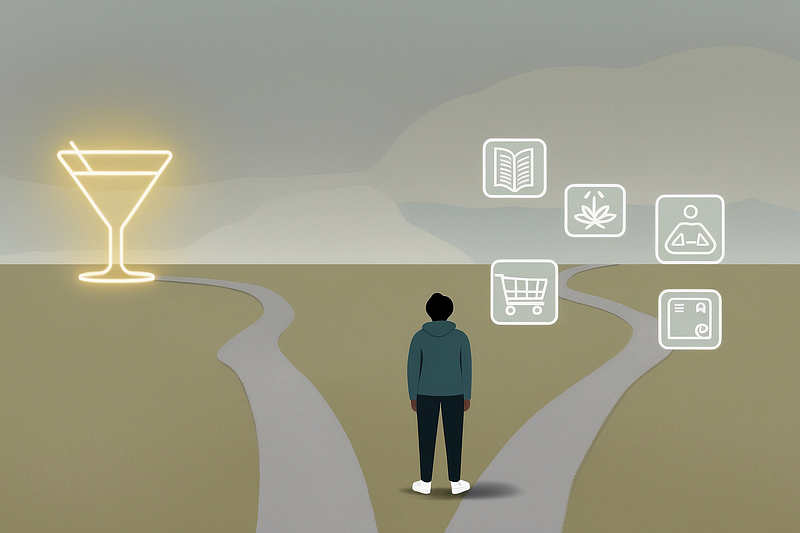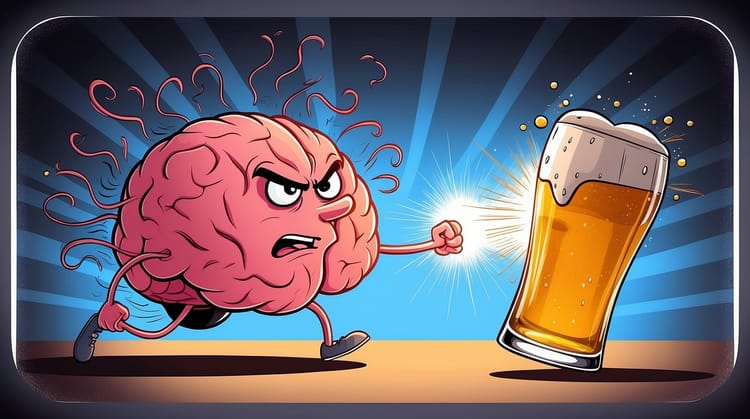Replacement — Navigating Early Sobriety

Early Sobriety: More Than Just Putting Down the Bottle
So, here we are, 18 days into this sobriety journey. It’s like learning to walk again, but instead of skinned knees, you’re dealing with a whole buffet of emotions and urges you’d forgotten existed.
The Sobriety Stumble: 18 Days and Counting
Recently, I heard about this term: “dry drunk.” It’s not the most charming phrase, is it? The gist is that you’ve quit drinking, but you’re still wrestling with the same old thought patterns and behaviours. It’s like changing the wrapping paper but keeping the same present inside.
Now, I’m not sold on the term. It feels a bit harsh, like we’re not giving ourselves enough credit for taking that massive first step of quitting. But it does bring up an interesting point about what happens after we put down the bottle.
Addiction Whack-a-Mole: When One Habit Pops, Another Appears
In my case, I’ve noticed my Amazon cart’s been getting more action than a squirrel at a nut festival. And my fridge? Let’s just say we’ve become very close friends. It’s like my brain’s playing a game of “addiction musical chairs” — when the music stops, it’s scrambling to find a new seat.
But here’s where things get interesting. What if, instead of replacing one potentially problematic behaviour with another, we tried something different? Something a bit more… philosophical?
Stoicism: The Unexpected Ally in Sobriety
Enter Stoicism. No, I’m not suggesting we all start wearing togas and speaking in riddles. I’m talking about a practical philosophy that’s all about focusing on what we can control and letting go of what we can’t. Sound familiar to anyone in recovery?
Imagine if, instead of reaching for a drink (or that fifth pair of novelty socks), we paused for a moment of reflection. “What would Marcus Aurelius do?” becomes less of a punchline and more of a genuine question.
I’m not claiming Stoicism is a cure-all. It’s not going to magically solve all our problems. But it might offer a new perspective, one that’s a bit clearer than what we used to find at the bottom of a glass.
As we navigate these early days of sobriety, it’s important to cut ourselves some slack. If you find yourself replacing one habit with another, don’t be too hard on yourself. Recognise it, reflect on it, and maybe try steering towards something that nourishes your mind and soul.
Sobriety isn’t just about not drinking. It’s about building a life that doesn’t make you want to escape. And if that life includes some ancient wisdom and the occasional impulse buy, well, that’s all part of the journey.
Now, if you’ll excuse me, I have a date with a book of Stoic meditations. And maybe a cookie. Because balance, right?
Stoic perspective on replacement behaviors:
The Stoic approach to addressing replacement behaviors, such as substituting one addiction for another, focuses on understanding the root causes of our actions and developing self-awareness. Stoicism teaches us to examine our impulses and habits critically, recognizing that simply replacing one unhealthy behavior with another does not address the underlying issue.
Relevant quote:
Epictetus wisely said
“First say to yourself what you would be; and then do what you have to do.”
This quote reminds us to align our actions with our true values and goals, rather than simply shifting from one unhealthy behavior to another.
Practical Stoic exercise:
To address replacement behaviors, try this Stoic journaling exercise:
1. Each evening, reflect on your actions throughout the day.
2. Identify any instances where you replaced one habit with another (e.g., replacing alcohol with overeating).
3. For each instance, ask yourself:
— What was the underlying need or emotion I was trying to address?
— How does this behavior align with my values and long-term goals?
— What virtuous action could I have taken instead?
4. Write down one specific, positive action you can take tomorrow to address the root cause rather than engaging in replacement behavior.
This exercise helps build self-awareness and encourages you to make conscious choices aligned with your values, rather than simply shifting addictions.
Stoic thought for the day:
“Accept only what is true. Work for the common good. Match our needs and wants with what is in our control. Embrace what nature has in store for us.” — Marcus Aurelius
This thought reminds us to focus on what truly matters and what we can control, rather than seeking temporary relief through replacement behaviours. By aligning our actions with truth, community, and acceptance, we can break the cycle of harmful habits and replacements.




Member discussion